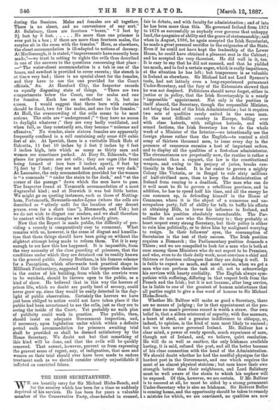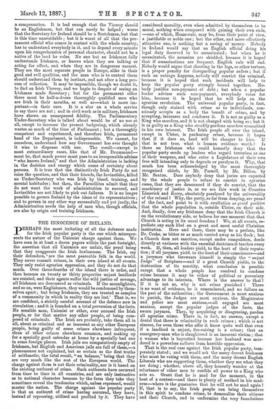THE IRISH SECRETARYSHIP.
WE are heartily sorry for Sir Michael Hicks-Beach, and for the country which has been for a time so suddenly deprived of his services. He has been for years a valuable member of the Conservative Party, clear-headed in counsel, fair in debate, and with faculty for administration ; and of late he has been more than this. He governed Ireland from 1874 to 1878 as successfully as anybody ever governs that unhappy land, the quagmire of abilityand the grave of statesmanship; and when in August, 1886, he again accepted the Irish Secretariat, he made a great personal sacrifice to the exigencies of the State. Even if he could not have kept the leadership of the Lower House, he could have obtained a pleasant seat in the Cabinet ; and he accepted the very thorniest. He did well in it, too. It is easy to say that he did not succeed, and that he yielded too much, and to feel a certain anger, which is really impatience, at the situation he has left ; but temperance is as valuable in Ireland as elsewhere. Sir Michael had not Lord Spencer's tools, had not latterly even a long-experienced permanent Under-Secretary, and the fury of the Extremists showed that he was not despised. Politicians should never forget, either in . justice or in ,policy, that the Irish Secretaryship is a nearly " impossible ' appointment. Not only is the position in itself absurd, the Secretary, though the responsible Minister, not being the head of the Irish Administration ; but it requires two sets of qualities rarely united in the same man. In the most difficult country in Europe, boiling over with class hatreds, with religious hatreds, and with armed factions, the Irish Secretary has to do the whole work of a Minister of the Interior—we intentionally use the foreign phrase rather than the English—to control a civil army of thirteen thousand men, to issue every day in the presence of rancorous enemies a host of important orders, and to display all the qualities of a first-class administrator. The circumstances are perpetually new, the routine is rather a confinement than a support, the law is the constitutional weapon, and owing to the perjury of juries, breaks con- tinually in the hand. It is far easier to govern a mighty Colony like Victoria, or in Bengal to rule sixty millions of half-civilised men, than to keep the Administration of Ireland from coming to a deadlock. The man who can do it well must be fit to govern a rebellious province, and in addition, he has to spend half his time, and all the energy he can summon up, in defending himself in the House of Commons, where it is the object of a numerous and un- scrupulous party, full of ability for talk, to baffle his efforts at obtaining Bills, to lower his influence in Ireland, and to make his position absolutely unendurable. The Par- nellites do not care who the Secretary is ; they probably at heart respect every strong Secretary, but their policy is either to ruin him politically, or to drive him by malignant worrying to resign. In their followers' eyes, the consumption of Secretaries is the test of their success. The Irish position requires a Bismarck ; the Parliamentary position demands a Thiers ; and we are compelled to look for a man who is both at once among those Ministers who do not expect to be Premiere, and who, even to do their daily work, must convince a chief and thirteen or fourteen colleagues that they are doing it well. It is futile to expect so much, and most unwise, when we get a man who can perform the task at all, not to acknowledge his services with hearty cordiality. The English always sym- pathise with suffering, differing in that respect both from the French and the Irish ; but it is not because, after long service, he is liable to one of the greatest of human misfortunes that all parties ought to give a due word of honour to Sir Michael Hicks-Beach.
Whether Mr. Balfour will make as good a Secretary, there are no means of judging ; for in that appointment at the pre- sent time no man's previous record is worth a straw. Our own belief is, that a silken aristocrat of capacity, with fine manners, a heart of steel, and a genuine indifference to obloquy, or, indeed, to opinion, is the kind of man most likely to succeed; but we have never governed Ireland. Mr. Balfour has a clear mind, a power of ready speech, much experience of men, though not of Ireland, and, we believe, quiet resolution. He will do as well as another, the only Irishman available having, it is said, refused the post, and all the better because of his close connection with the head of the Administration. We should doubt whether he had the needful physique for the hardest post in the Government, and one which requires the most of an almost physical stoicism; but men know their own strength better than their neighbours, and Lord Salisbury must be well aware of the strain to which his nephew will be exposed. Of this, however, we are certain. If Mr. Balfour is to succeed at all, he must be aided by a strong permanent Under-Secretary who is also an Irishman. Sir Redvers Buller is coming home, and the opportunity should be taken to remedy a mistake for Which, we are convinced, no qualities are now
a compensation. It is bad enough that the Viceroy should be an Englishman, but that can rarely be helped ; worse that the Secretary for Ireland should be a Scotchman, but that is this time unavoidable ; but it is worst of all that the per- manent official who comes in contact with the whole country, has to understand everybody in it and to depend every minute upon his comprehension of personal character, should not be a native of the land he rules. No one but an Irishman fully understands Irishmen, or knows when they are talking or acting for effect, and when they are in dangerous earnest. They are the most separate people in Europe, alike in their good and evil qualities, and the man who is to control them should understand them by instinct, and not after a long pro- cess of reflection. It may be impossible, though we doubt it, to find an Irish Viceroy, and we begin to despair of seeing an Irishman made Secretary ; but for the permanent office there must be half-a-dozen thoroughly qualified men who are Irish in their mouths, as well as—what is more im- portant—in their ears. It. is a slur on a whole service to say there are not ; and in civil work as in military, Irishmen have shown an unsurpassed fidelity. The Parliamentary Under-Secretary who is talked about would be of no use at all, except to increase the present badgering, which already wastes so much of the time of Parliament ; but a thoroughly competent and experienced, and therefore Irish, permanent head of the Department, is indispensable. We cannot, for ourselves, understand how any Government has ever thought it wise to dispense with one. The result—except in most extraordinary oases, like that of Mr. Drummond— must be, that much power must pass to an irresponsible adviser "who knows Ireland," and that the Administration is lacking in the decision and energy which come of certainty about persons. It is true that the distinctively Irish Party do not raise the question, and that their friends, the Invincibles, killed an Under-Secretary who was Irish by blood, training, and mental habitudes ; but then, the Parnellites admit that they do not want the work of administration to succeed, and Invincibles are not likely to pick out failures. It is no longer possible to govern Ireland by the ideas of its representatives ; and to govern in any other way successfully and yet justly, the Administration needs the help of men who, though officials, are also by origin and training Irishmen.



































 Previous page
Previous page